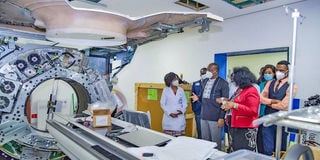Premium
Fund research in varsities to fight diseases

Health Cabinet Secretary Mutahi Kagwe during the installation of a 3T MRI machine at Kenyatta University Teaching, Referral and Research Hospital. With him are the hospital’s board chairperson Prof Olive Mugenda (right) and the Head of Radiology Dr Sarah Osiemwo.
What you need to know:
- Universities have the solid platform of basic science, what they lack is funding to set up systems.
- Rapid funding of research on pandemics will enhance the role of universities as knowledge generators and problem-solvers.
Covid-19 exploded as a nuclear bomb and spread throughout the world as bush fire. Lack of preparedness and capacity to develop and implement emergency responses led to loss of many lives.
In Kenya, the first Covid-19 case was reported in March. Some measures that were put in place to minimise its spread included wearing face masks, social distancing, hand washing with soap and running water or use of alcohol hand sanitiser.
As time went by, Kenya developed confidence in handling the pandemic. The public was continuously sensitised on the ferocity of the pandemic to all dimensions of life. However, cases were on the rise since March.
Universities, through internal funding mechanisms, manufactured face masks, soap and sanitisers. These were donated to the public as social corporate responsibility or sold at affordable prices.
For some of the universities, this was probably the first-time-ever to release their research-based products to the market. The pandemic offered university a rare chance to connect with the society and to lead from the front on local issues while tackling a global challenge.
University’s research activities are majorly funded by the government and other external agencies.
The Science Technology and Innovation Act No. 28, Section 32 of 2013 led to the establishment of the National Research Fund (NRF) with key mandate to allocate and manage financial resources to facilitate innovations.
In April, NRF launched a call for research proposals to combat Covid-19. This call brought hope to researchers who within a month, had developed hundreds of proposals based on key areas such as testing, prevention and management of the disease.
Political urgency
While the call was timely, its execution by NRF has created a feeling of despair. The proposals have been under review for the past seven months, resisting the urge for urgency in mitigating the pandemic.
If the funds had been made available, universities would have harnessed the full potential of the inter, trans, and multi-disciplinary research. Delayed funding or its lack, does not strengthen the position of universities in solving societal issues.
Globally, the academia and industries have had combined effort in development of the vaccine that has since been rolled out in the United Kingdom, the United States, Europe and Asia.
It will go into history that the vaccine was the fastest since the 1960s. We can draw a lesson from this experience that when there is an emergency and sufficient funds availed, solutions to future problems could be accelerated substantially without compromising global safety standards.
Research has also shown that when there is social and political urgency, solution to a problem is accelerated.
Universities have the solid platform of basic science, what they lack is funding to set up systems that will predict, monitor and manage future pandemics.
Rapid funding of research on pandemics will enhance the role of universities as knowledge generators and problem-solvers.
This will therefore change the customary way of measuring impact of research by the number of peer-citations.





